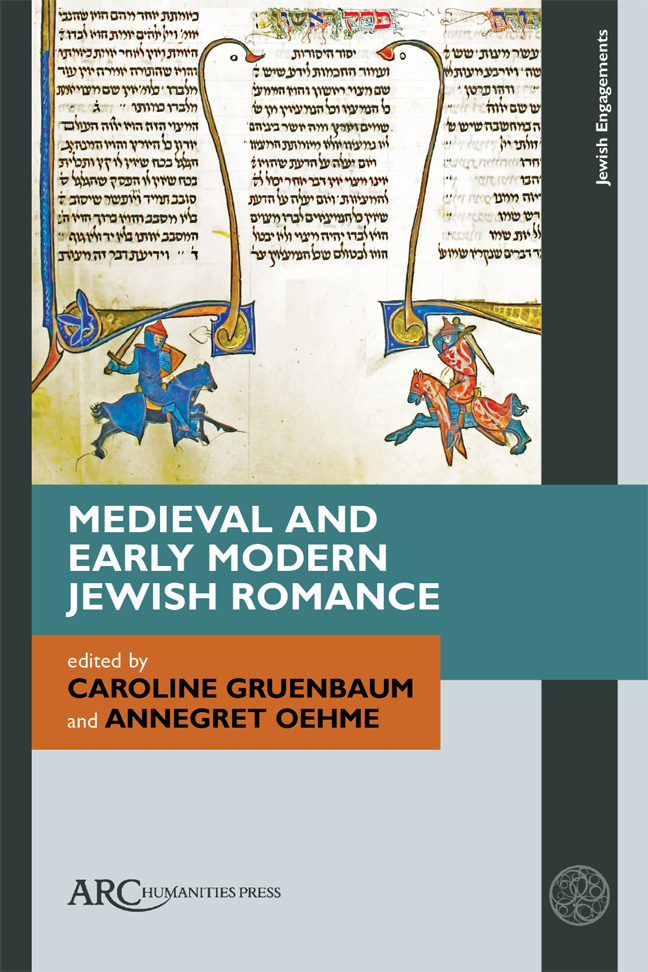Book contents
- Frontmatter
- Dedication
- Contents
- List of Illustrations
- Acknowledgements
- Introduction
- The Zohar as Medieval Jewish Romance
- Letters of Loathing: Immanuel of Rome and Romance Epistolary
- Illuminated Knights and Tales of Romance in the Rothschild Miscellany
- The Queen Nudatio: A Romanesque (?) Topos in Israel Caslari's Roman d’Esther
- At the Court of the Demon King: The Story of the Jerusalemite and Chivalric Romance
- Melekh Artus as a Jewish Romance: Horizons of Expectation and Genre Configurations
- A Friend in Need is a Friend Indeed?Friendship, Love, and Loyalty in the Yiddish Seven Sages of Rome
- Stealing Back One's Husband: The Yiddish Mayse mi-Danzek in the Context of Early Modern German Cross-Dressing Narratives
- Romance Elements in Meshal Haqadmoni by Isaac Ibn Sahula: A New Reading
- Afterword: Jewish Romance in Search of Identity
- Select Bibliography
- Index
The Zohar as Medieval Jewish Romance
Published online by Cambridge University Press: 18 February 2024
- Frontmatter
- Dedication
- Contents
- List of Illustrations
- Acknowledgements
- Introduction
- The Zohar as Medieval Jewish Romance
- Letters of Loathing: Immanuel of Rome and Romance Epistolary
- Illuminated Knights and Tales of Romance in the Rothschild Miscellany
- The Queen Nudatio: A Romanesque (?) Topos in Israel Caslari's Roman d’Esther
- At the Court of the Demon King: The Story of the Jerusalemite and Chivalric Romance
- Melekh Artus as a Jewish Romance: Horizons of Expectation and Genre Configurations
- A Friend in Need is a Friend Indeed?Friendship, Love, and Loyalty in the Yiddish Seven Sages of Rome
- Stealing Back One's Husband: The Yiddish Mayse mi-Danzek in the Context of Early Modern German Cross-Dressing Narratives
- Romance Elements in Meshal Haqadmoni by Isaac Ibn Sahula: A New Reading
- Afterword: Jewish Romance in Search of Identity
- Select Bibliography
- Index
Summary
IN RECENT YEARS, scholarship on the Zohar—the masterpiece of Jewish mysticism, Kabbalah, composed for the most part in late thirteenth and early fourteenth century Castille, modern-day central and north-western Spain—has moved decidedly to greater appreciation and understanding of the Zohar as a work of literature and poetics in addition to its long established status as a classic of mystical theology, hermeneutical creativity, myth, and many other dimensions of the history of ideas. Indeed, this has been a centrepiece of my own research and writing for many years. In addition to studying an array of narrative form-critical phenomena in regard to the Zohar's use of fiction and storytelling, I also sought to situate zoharic poetics in the broader landscape of Iberian Jewish and Christian literature.
In this essay, in keeping with the theme of this volume, I shall offer several frames of interpretation through which zoharic poetics—in the intersecting genres of narrative fiction and prose poetry—may once again be seen as a literary product of the Zohar's times, in this instance as a literary landscape that reflects elements and tropes of medieval romance literature, even if decidedly transformed to align with the larger symbolism and purposes of kabbalistic thought and practice. As I see the matter, there are a number of intriguing correlations between romance literature as it was developed in several cultural contexts and the thematics and forms of the Zohar. These lines of connection support the idea that a range of structures, images, and motifs attributable to and associated with classic medieval romance were accessibly percolating in the cultural-folk atmosphere of various European geographies of this time, including Iberia, as well as the strong likelihood that literary and material artifacts containing these forms and motifs made their way across Europe, specifically from Jewish centres in Ashkenaz to those in Sepharad.
It is well established now that cross-pollinations of culture through the movement and migration of people between Ashkenaz and Sepharad was far more common that was thought in prior generations of scholarship on medieval culture and history. This was likely the case with the core Arthurian legends of chivalric romance, probably including the highly significant Hebrew translation of a Franco-Italian manuscript of Arthurian romance dating to the year 1279.
- Type
- Chapter
- Information
- Medieval and Early Modern Jewish Romance , pp. 15 - 34Publisher: Amsterdam University PressPrint publication year: 2023



